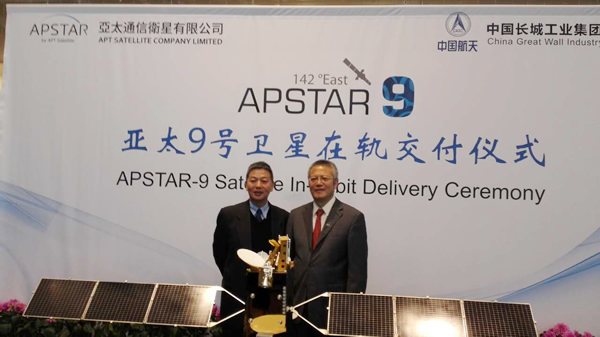| APSTAR-9 SATELLITE COMPLETES IN-ORBIT DELIVERY TO THE CUSTOMER SUCCESSFULLY | The current page: Home -> News |
On January 20, 2016, China Great Wall Industry Corporation ("CGWIC), which is subordinated under China Aerospace Science and Technology Corporation, and APT Satellite Company Limited ("APT") jointly conducted the ceremony to celebrate the successful in-orbit delivery to the customer the Apstar-9 satellite.

Apstar-9 satellite was launched on October 17, 2015 by the Long March 3B launch vehicle from the Xichang Satellite Launch Center at Sichuan province of China. The satellite conducted LEOP operations, including five apogee firings and perigee engine firings, and positioned at the orbit slot for in-orbit test (IOT). The tracking and control operation of the Apstar-9 satellite was transferred to the APT ground station at Taipo, Hong Kong after being positioned at the IOT orbit position. Since October 25, 2015, the Apstar-9 satellite has made in-orbit tests in two phases from two ground stations at Hong Kong and Jakarta, Indonesia respectively. After the completion of first phase test on November 10, 2015, the satellite drifted to the final orbit and was finally positioned at 142° East longitude geostationary orbit on November 18, 2015. On November 29, 2015, Apstar-9 finished all in-orbit tests and a comprehensive in-orbit test report was delivered to the customer of APT. On December 4, 2015, Apstar-9 satellite in-orbit acceptance review (IOAR) and the final acceptance review of the ground control system at Hong Kong ground station was hold successfully, and the title and ownership of the Apstar-9 satellite was transferred to APT on December 15, 2015. Now the Apstar-9 satellite operates in good condition in orbit.
The Apstar-9 satellite in-orbit delivery contract was signed on November 22, 2013 between China Great Wall Industry Corporation and APT Satellite Company Limited. According to the contract, CGWIC as the Prime Contractor, was tasked to design, manufacture, assemble, test, launch and deliver the APSTAR-9 satellite in orbit and other ground deliverable items necessary for the satellite operation, with the support of its subcontractors, China Academy of Launch Vehicle Technology (CALT), China Academy of Space Technology (CAST), and China Satellite Launch and Tracking Control General (CLTC).

This is the first time for APT to procure the Chinese-made Apstar-9 communication satellite which is based on DFH-4 satellite platform. This is also the first time for China Space industry to deliver the communications satellite to an established international satellite operator, which marks that the Chinese DFH-4 communication satellite has entered the international leading operator market successfully. Apstar-9 is the 6th DFH-4 communication satellite delivered in orbit to the international customers by CGWIC. Up to now, the maturity and reliability of the DFH-4 communications satellite has been comprehensively verified and gradually acknowledged by the international customers.
APSTAR-9 satellite is designed with six (6) transponder beams and is equipped with forty-six (46 ) operational transponders (including 32 in C-band and 14 in Ku-band) onboard, having the capacity to switch among beams with cross-link functionality, which will have positive contribution to improve the technology and maturity of the DFH-4 platform satellite.
Apstar-9 satellite has unique coverage including the South China Sea, east India Ocean and the west Pacific Ocean, and will have big potential market in providing improved services to satisfy the Chinese ocean strategy and the national strategy of the Silk Road Economic Belt and the 21st-Century Maritime Silk Road, together with the existing satellite fleet of APT.
The LM-3B launch vehicle, which has been used for the launch of Apstar-9 satellite, is the most powerful launch vehicle for GTO mission in Long March fleet at present, capable of launching a payload up to 5,500 kg into standard GTO. In the past year of 2015, Long March launch vehicles fleet has conducted nineteen (19) launches in total with all success. Up to now, the Long March series launch vehicles have made two hundred and twenty three (223) flights in total, with the total success rate at 95.52%. The Long March 3A series launch vehicles have made seventy-one (71) launches with the success rate at 97.2%. The launch number and the launch reliability of the Long March series launch vehicles have been outstandingly acknowledged by the international aerospace industry.
APT Satellite, a company incorporated in Hong Kong, is the most leading satellite operators in the Asia Pacific region. Its APSTAR satellites fleet, covering about 75% of the world's population, provides superior "one-stop-shop" satellite transponder leasing, broadcast, Teleport and Network, as well as data center services to broadcasters and telecommunication customers.
Date:2016-01-21

